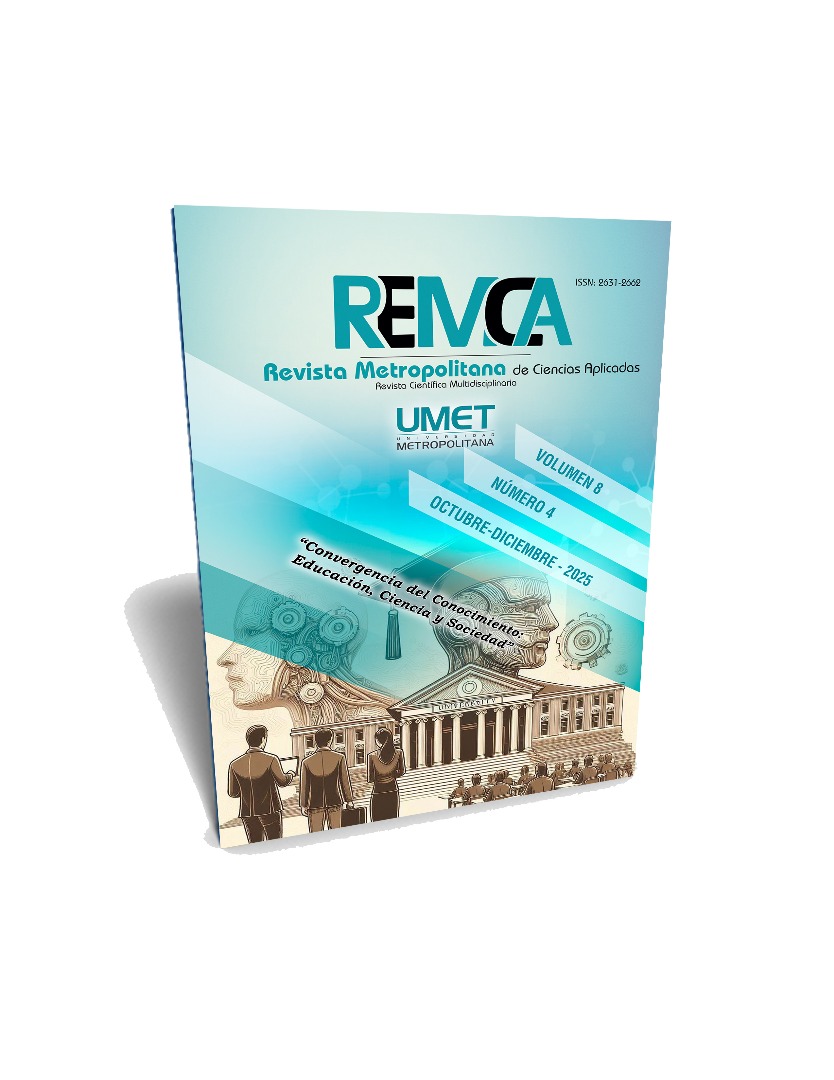Correlation between cultural outreach strategies and identity sustainability of community tourism
DOI:
https://doi.org/10.62452/djy1tk18Keywords:
Community tourism, cultural control, cultural hybridization, identity sustainabilityAbstract
The research seeks to establish the empirical correlation between effectiveness of cultural communication strategies and identity preservation in Ecuadorian community tourism through quantitative measurement instruments, methodology: Cross-sectional correlational design implemented in three emblematic cases: Agua Blanca (Coast), Saraguro (Highlands), and Napo Kichwa (Amazon). The IEED-ISC system was constructed based on Bonfil Batalla's cultural control theories and García Canclini's hybridization processes, sample of participants selected through stratified sampling, complemented by interviews and participant observation, results: The IEED-ISC system demonstrated appropriate psychometric properties, significant correlations were identified between cultural dissemination strategies and identity sustainability, multiple regression revealed that five dimensions explain most of the variance, with autonomy in communication management as the strongest predictor, followed by cultural fidelity and intercultural dialogue, comparative analysis identified differentiated patterns: Saraguro excelled in cultural fidelity, Agua Blanca in cultural innovation, and Napo Kichwa in autonomy of cultural change, conclusions: The research empirically suggests that it is possible to develop cultural dissemination strategies that simultaneously contribute to tourist attraction and identity preservation when communities maintain communication control. Findings quantitatively validate theoretical frameworks of cultural control, evidencing that communities exercise effective agency over cultural outcomes of community tourism.
Downloads
References
Barquera Martínez, A., Velázquez Hernández, J. A., González Hernández, F. S., & Romero Zepeda, J. A. (2024). Entre tradición y modernidad: Análisis crítico del Folklore en la Industria Cultural. LATAM Revista Latinoamericana de Ciencias Sociales y Humanidades, 5(6). https://doi.org/10.56712/latam.v5i6.3102
Chontasi, D., Espeso-Molinero, P., & Pastor-Alfonso, M. J. (2025). The sustainability of Community-based sustainability through resilience thinking: the case of Yunguilla (Ecuador). Documents d’Analisi Geografica, 71(1), 5–31. https://doi.org/10.5565/rev/dag.907
Gaibor Sotomayor, W. P., Carpio Álvarez, D. G., & Novoa Brito, C. H. (2024). Análisis de la “Importancia de la Reactivación Y Resiliencia del Turismo Comunitario en el Ecuador POST COVID 19. Green World Journal, 7(08), 152–152. https://doi.org/10.53313/gwj72152
Hermawan, Y., Sujarwo, S., & Suryono, Y. (2023). Learning From Goa Pindul: Community Empowerment through Sustainable Tourism Villages in Indonesia. Qualitative Report, 28(5), 1365–1383. https://doi.org/10.46743/2160-3715/2023.5865
Huaraca Vera, L., Kang, M., & Echarri Chavez, M. (2021). Turismo comunitario: del concepto a la gestión. La experiencia ecuatoriana. Revista Científica Ecociencia, 8(6), 1–24. https://doi.org/10.21855/ecociencia.86.570
Maldonado-Erazo, C. P., Del Río-Rama, M. de la C., Miranda-Salazar, S. P., & Tierra-Tierra, N. P. (2022). Strengthening of Community Tourism Enterprises as a Means of Sustainable Development in Rural Areas: A Case Study of Community Tourism Development in Chimborazo. Sustainability (Switzerland), 14(7). https://doi.org/10.3390/su14074314
Maldonado-Erazo, C. P., del Río-Rama, M. de la C., Noboa-Viñan, P., & Álvarez-García, J. (2020). Community-based tourism in Ecuador: Community ventures of the provincial and cantonal networks. Sustainability (Switzerland), 12(15). https://doi.org/10.3390/SU12156256
Mamani Flores, A. (2024). Relaciones Interculturales en la Práctica del Turismo Rural Vivencial en el Centro Poblado de Ccotos – Distrito de Capachica, Puno. Revista Veritas de Difusão Científica, 5(2), 967–1005. https://doi.org/10.61616/rvdc.v5i2.134
Ordoñez Sotomayor, A., & Ochoa Cueva, P. (2020). Ambiente, sociedad y turismo comunitario: La etnia Saraguro en Loja – Ecuador. Revista de Ciencias Sociales (RCS), 26(2). http://orcid.org/0000-0003-2230-1026
Piedra Sarría, Y. L., Moya Padilla, N. E., & Varona Domínguez, F. (2022). La categoría hibridación multicultural en la obra de Néstor García Canclini, aporte y significación. Revista Conrado, 18(88), 269–274. https://conrado.ucf.edu.cu/index.php/conrado/article/view/2601
Quichimbo Saquichagua, F. F., Verdugo Guamán, M. E., Sánchez Jimbo, S. P., & Mendieta Sinche, P. A. (2022). ¿Qué es interculturalidad? Reflexiones en el contexto ecuatoriano a partir de las voces y visiones de los docentes. Killkana Social, 6(1), 35–46. https://doi.org/10.26871/killkanasocial.v6i1.1024
Reyes-Santiago, M. del R., Pérez-López, E. I., & Méndez-García, E. M. del C. (2024). Control cultural en la gastronomía de San Pedro y San Pablo Teposcolula, Oaxaca, México. Estudios Sociales. Revista de Alimentación Contemporánea y Desarrollo Regional, 34(63). https://doi.org/10.24836/es.v34i63.1439
Sarabia-Molina, M. Y., Soares, J. R. R., & Lois-González, R. C. (2022). Innovations in Community-Based Tourism: Social Responsibility Actions in the Rural Tourism in the Province of Santa Elena–Ecuador. Sustainability (Switzerland), 14(20). https://doi.org/10.3390/su142013589
Vera-Peña, V. M., Guillen-Herrera, S. R., Neira-Reyes, I. A., & Fuentes-Torres, N. A. (2025). Raíces vivas: Turismo comunitario e identidad cultural en el Ecuador. Sophia Editions.
Zavaleta Chavez Arroyo, F. O., Sánchez Pantaleón, A. J., Navarro-Mendoza, Y. P., & Esparza-Huamanchumo, R. M. (2023). Community Tourism Conditions and Sustainable Management of a Community Tourism Association: The Case of Cruz Pata, Peru. Sustainability (Switzerland), 15(5). https://doi.org/10.3390/su15054401
Downloads
Published
Issue
Section
License
Copyright (c) 2025 Víctor Manuel Vera-Peña, Laura Cárdenas-Zhuma, Alexandra Nathaly Fuentes-Torres, Melisa Eufemia Silva-Zambrano (Autor/a)

This work is licensed under a Creative Commons Attribution-NonCommercial-ShareAlike 4.0 International License.
Authors who publish in Revista Metropolitana de Ciencias Aplicadas (REMCA), agree to the following terms:
1. Copyright
Authors retain unrestricted copyright to their work. Authors grant the journal the right of first publication. To this end, they assign the journal non-exclusive exploitation rights (reproduction, distribution, public communication, and transformation). Authors may enter into additional agreements for the non-exclusive distribution of the version of the work published in the journal, provided that acknowledgment of its initial publication in this journal is given.
© The authors.
2. License
The articles are published in the journal under the Creative Commons Attribution-NonCommercial-ShareAlike 4.0 International License (CC BY-NC-SA 4.0). The terms can be found at: https://creativecommons.org/licenses/by-nc-sa/4.0/deed.en
This license allows:
- Sharing: Copying and redistributing the material in any medium or format.
- Adapting: Remixing, transforming, and building upon the material.
Under the following terms:
- Attribution: You must give appropriate credit, provide a link to the license, and indicate if any changes were made. You may do this in any reasonable manner, but not in any way that suggests the licensor endorses or sponsors your use.
- NonCommercial: You may not use the material for commercial purposes.
- ShareAlike: If you remix, transform, or build upon the material, you must distribute your creation under the same license as the original work.
There are no additional restrictions. You may not apply legal terms or technological measures that legally restrict others from doing anything the license permits.




